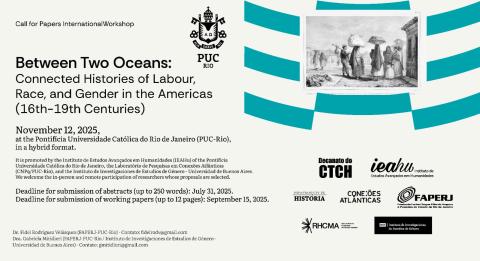
Hybrid seminar at the Pontifícia Universidade Católica do Rio de Janeiro, 2 November 2025
In recent years, labour and its many worlds have once again occupied a central place in historiographical debates on the history of the Americas. This renewed interest has not only brought a critical lens to hierarchies, coercion, and violence—both past and present—but has also sought to examine the agency, negotiations, connections, and strategies of those who, from below, acted amid various forms of inequality. We are grounded in a tradition of social and cultural labour history that seeks to understand the heterogeneous labour realities across the Americas. This field of study has placed workers—men and women—their families, support networks, spaces of socialisation, and lives in movement at the centre of analysis, enriching the notion of "worlds of labour" by showing how labour experiences are deeply intertwined with cultural values, political identities, and racial and gender relations. This fertile historiography has pushed beyond the factory, the union, and the white male worker as the privileged historical subject and beyond the classic periodisations that defined labour as a by-product of capitalism and the industrial revolution.
From this perspective, we aim to contribute to the global and connected histories of labour, focusing on the period between the 16th and 19th centuries, and inviting reflections on how racial and gendered relations shaped these labouring worlds. We seek to make explicit how collective imaginaries of difference have been inscribed in labour dynamics, reinforcing, challenging, and subverting established hierarchies. We aim to echo these entangled conversations and are particularly committed to including the voices of young scholars from the global South—voices that have too often been sidelined in these historiographical debates. In addressing these absences, we highlight, on one hand, disparities in access to research funding and the pervasive preference for English as the default language for narrating the history of the Americas. On the other hand, we underscore the persistence of historiographical traditions that have long taken methodological nationalism as both their point of departure and arrival.
We are especially interested in contributions that question, expand, or reframe methodological nationalism in the Americas by focusing on the transnational circulation of people, ideas, and labour practices. We welcome, in particular, studies that explore connections between the Atlantic and Pacific Oceans and labour circuits across the Pacific that can challenge Atlantic centrality. To that end, we invite research that explicitly employs connected history methodologies (e.g., multi-case studies, network analysis, prosopography, or transnational microhistory) and that integrates interdisciplinary approaches (history, anthropology, sociology, gender studies) to investigate the intersections of race, gender, and labour. By centring the Americas in this analysis, we open space for comparative and relational inquiries into colonisation, population movements, the imposition of diverse forms of coerced labour, and the formation of global markets and exchange networks.
In this spirit, we encourage submissions in multiple languages (Spanish, Portuguese, English, and French) and, through a hybrid format, seek to broaden participation among researchers with limited access to funding or traditional academic venues.
Important information:
The seminar Between Two Oceans: Connected Histories of Labour, Race, and Gender in the Americas (16th–19th centuries) will take place on 12 November 2025 at the Pontifícia Universidade Católica do Rio de Janeiro (PUC-Rio), in a hybrid format. The event is promoted by Laboratório de Pesquisas em Conexões Atlânticas (CNPq/PUC-Rio). We look forward to welcoming in-person and remote participants whose proposals are selected.
Deadline for abstract submissions: 31 July 2025
Deadline for extended abstracts (up to 12 pages): 15 September 2025
Submissions to: gmitidieri@gmail.com / fidelrodv@gmail.com
Fidel Rodríguez Velásquez (fidelrodv@gmail.com)
Pontifícia Universidade Católica do Rio de Janeiro (PUC-Rio)
Gabriela Mitidieri (gmitidieri@gmail.com)
Pontifícia Universidade Católica do Rio de Janeiro (PUC-Rio)
Instituto de Investigaciones de Estudios de Género (UBA)
